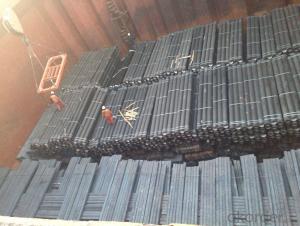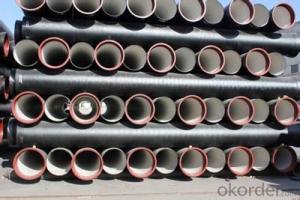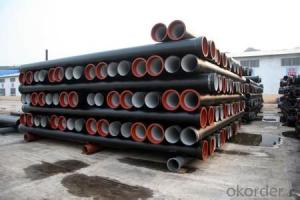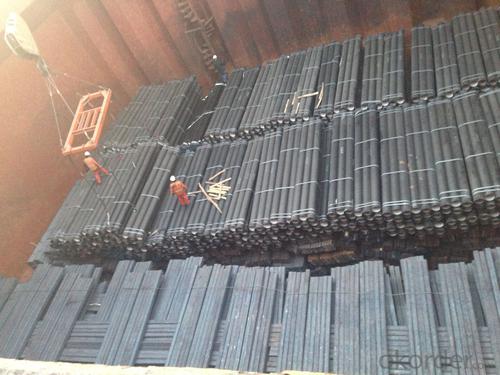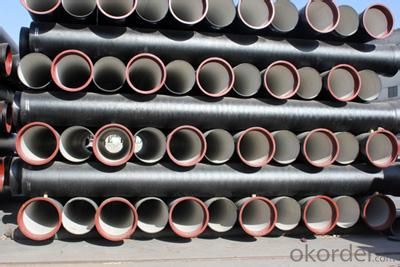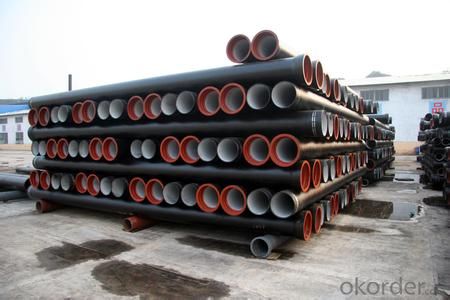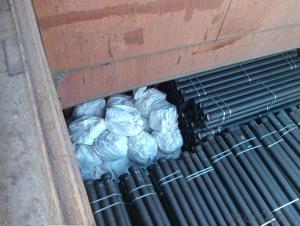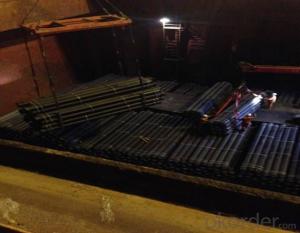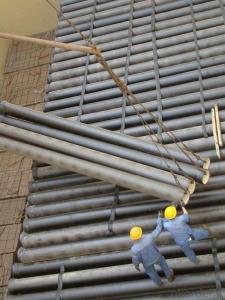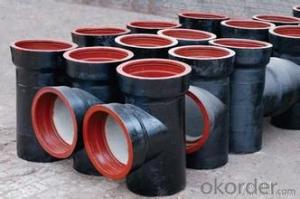DUCTILE IRON PIPE K9 DN450
- Loading Port:
- China Main Port
- Payment Terms:
- TT OR LC
- Min Order Qty:
- -
- Supply Capability:
- -
OKorder Service Pledge
OKorder Financial Service
You Might Also Like
Ductile Iron Cast Pipe is without any defects compare with tradition casting tech, which has many advantages particularly as follow:
(1) High density. In the "vertical upward casting" process, the melt iron of centre liquid column in center crystallizer is continuously feeding for volume shrinkage caused by condensation tube at outer circumference , which lead to be free of shrinkage porosity.
(2) High purity. When melt iron pouring, the mixed impurities such as gas, dross, sand grain which are lighter than melt iron could be eliminated at furnace mouth, its impossible to enter into the crystallizer through the channel, so the melt iron into the crystallizer is very pure.
(3) Strength with toughness. The cooling speed provided by continuous crystallizer is 30 times than sand casting and 5 times than centrifugal casting, and doesn't produce white iron, the eutectic cell volume of continuous cast iron is one eighth to one tenth compare with traditional cast iron. The density of graphite nodule in ductile iron can reach 300-700 pcs/mm2. Therefore, all reason above improve the strength and toughness of continuous cast iron.
(4) Free machining. The high speed cooling make the hardening phase (such as boride, steadite) not appear like reticular, massive or thick, but diffuse like fish bone and pane in shape, moreover, there are tiny graphite flakes inlaid hardening phase. It's free machining in BrinellHardness the range of 250-300HB. However, the Brinell Hardness of 250 is top limit to common metal materials.
(5) Uniform composition of tube wall. The convection mixing of liquid column caused by marching type drawing in crystallizer make the composition of tube wall well-distributed, and concentration gradient very little.
(6) High productivity. To the wall thickness of tube under 10mm, the speed of continuous casting is 1 meter/min, to the wall thickness of tube under 20mm, the speed of continuous casting is 0.5 meter/min, which is high efficiency that centrifugal or other casting tech couldn't reach.
- Q: How do ductile iron pipes perform in high-temperature water applications?
- Ductile iron pipes are known for their strength, durability, and excellent mechanical properties, which make them suitable for a wide range of applications. However, when it comes to high-temperature water applications, certain considerations need to be taken into account. Ductile iron pipes generally perform well in high-temperature water applications up to a certain threshold. The exact temperature limit depends on the specific grade of ductile iron used and the duration of exposure to high temperatures. In general, ductile iron pipes can withstand temperatures up to 350-400 degrees Fahrenheit for short periods without significant degradation or loss of strength. However, it is important to note that prolonged exposure to high temperatures can have detrimental effects on ductile iron pipes. At elevated temperatures, ductile iron pipes may experience a phenomenon called thermal degradation, which can lead to reduced mechanical properties, increased brittleness, and even cracking or failure over time. To mitigate the risks associated with high-temperature water applications, several measures can be taken. Firstly, selecting the appropriate grade of ductile iron with a higher temperature tolerance can enhance the pipe's performance. Secondly, implementing proper insulation or heat shielding measures can help minimize the direct heat transfer to the pipes, thereby reducing the potential for thermal degradation. Additionally, regular monitoring and maintenance of ductile iron pipes in high-temperature water applications are crucial to identify any signs of degradation or damage early on and take appropriate remedial actions to prevent failure. In summary, while ductile iron pipes can generally perform well in high-temperature water applications, it is important to carefully consider the specific conditions and requirements of the application to ensure their long-term performance and integrity.
- Q: How are ductile iron pipes protected against mechanical damage?
- Various measures are implemented to protect ductile iron pipes from mechanical damage, ensuring their durability and longevity. One effective approach involves applying a protective coating to the exterior surface of the pipes. This coating acts as a barrier, safeguarding the ductile iron from physical abrasion, impact, and corrosion. Depending on specific requirements and environmental conditions, the coating can be composed of materials such as epoxy, polyethylene, or zinc. In addition to the protective coating, ductile iron pipes are designed with a high level of structural strength. They are manufactured to withstand significant pressure and external forces, making them less vulnerable to mechanical damage. The inherent strength of the material enables the pipes to resist deformation and cracking, even when subjected to heavy loads or ground movements. Moreover, proper bedding and backfilling techniques are employed during the installation of ductile iron pipes. This involves carefully placing the pipes in a prepared trench to ensure a stable foundation and minimize the risk of external forces causing damage. The correct backfill material is then used to provide support and prevent excessive pressure on the pipes. To further enhance protection against mechanical damage, additional measures such as concrete encasement or protective sleeves are often employed during the installation of ductile iron pipes. Concrete encasement involves surrounding the pipe with a layer of concrete, offering an extra layer of defense against external forces. Protective sleeves can also be utilized in areas prone to impact or where additional protection is necessary. Regular inspections and maintenance play a crucial role in ensuring the continuous protection of ductile iron pipes against mechanical damage. Periodic checks for signs of wear, corrosion, or other forms of damage enable timely repairs or replacements, preventing further deterioration. In summary, a combination of protective coatings, structural strength, proper installation techniques, and regular maintenance effectively safeguards ductile iron pipes against mechanical damage, guaranteeing their reliable performance and long lifespan in various applications.
- Q: How does ductile iron pipe handle soil movements and settlements?
- Ductile iron pipe has excellent resistance to soil movements and settlements due to its high tensile strength and flexibility. The pipe's ability to withstand soil loads and settle without compromising its structural integrity makes it a reliable choice for underground applications. Additionally, the pipe's joint design allows for some degree of movement, further reducing the risk of damage or failure.
- Q: Can ductile iron pipes be used for railway bridges?
- Yes, ductile iron pipes can be used for railway bridges. They are commonly used in bridge construction due to their high strength, durability, and resistance to corrosion. Additionally, ductile iron pipes can withstand heavy loads and provide excellent structural support, making them suitable for railway bridge applications.
- Q: When the ductile iron pipe is pressed, the three links are always running out. What should be done?
- If the pipe is not laid, but installed outdoors, it is recommended to cement the pier and stabilize the pipe at the three and the pipe connection. The problem of the above situation lies in the pressure test in the open air, the outer wall of the pipe without the external pressure and the balance of internal pressure. Xin hot pipe industry
- Q: What is the expected pressure rating for ductile iron pipes?
- The pressure rating for ductile iron pipes can differ based on factors like pipe diameter, wall thickness, and specific application. In general, ductile iron pipes are built to endure high-pressure situations. They are frequently utilized in water and wastewater systems, where they can normally manage pressures ranging from 150 psi to 350 psi or more. To ensure safe and dependable operation, it is crucial to refer to the manufacturer's specifications or relevant industry standards for precise pressure ratings based on pipe size and application.
- Q: Can ductile iron pipes be used for underground geothermal systems?
- Yes, ductile iron pipes can be used for underground geothermal systems. Ductile iron pipes are known for their strength, durability, and resistance to corrosion, making them suitable for various applications, including underground geothermal systems. These pipes can handle high temperatures and pressures, making them ideal for the transport of hot geothermal fluids. Additionally, ductile iron pipes have a long service life and can withstand the ground movements and stresses that occur in underground installations. Therefore, they can be a reliable choice for underground geothermal systems.
- Q: What do ductile iron pipes need to connect with three? Can I contact it directly?
- Because the interface material used in the old process is poisonous, especially in the water supply pipeline, environmental protection requires a new process now
- Q: What's the difference between ductile iron pipe and cast iron pipe?
- We have to correct now basically all socket ductile iron pipes, because the socket type with a rubber ring, plus a ductile material, buried beneath it when the bearing has a certain flexibility, not because of the deformation and leakage phenomenon. To be used, not Unicom cast iron pipe socket, connection is used similar to the stainless steel hoop hoop sleeve closed.
- Q: Is the water cast iron pipe 100% for hydrostatic test?
- Domestic manufacturers, such as steel group wing ductile iron pipe limited liability company, Xinxing Ductile iron pipes, Saint Gobain pipe is 100% factory test pressure, test pressure in 3.2-5.0MPa according to different specifications.
Send your message to us
DUCTILE IRON PIPE K9 DN450
- Loading Port:
- China Main Port
- Payment Terms:
- TT OR LC
- Min Order Qty:
- -
- Supply Capability:
- -
OKorder Service Pledge
OKorder Financial Service
Similar products
Hot products
Hot Searches
Related keywords
